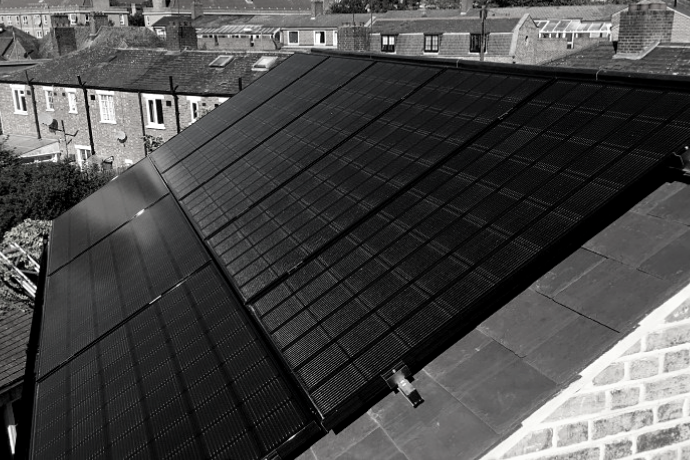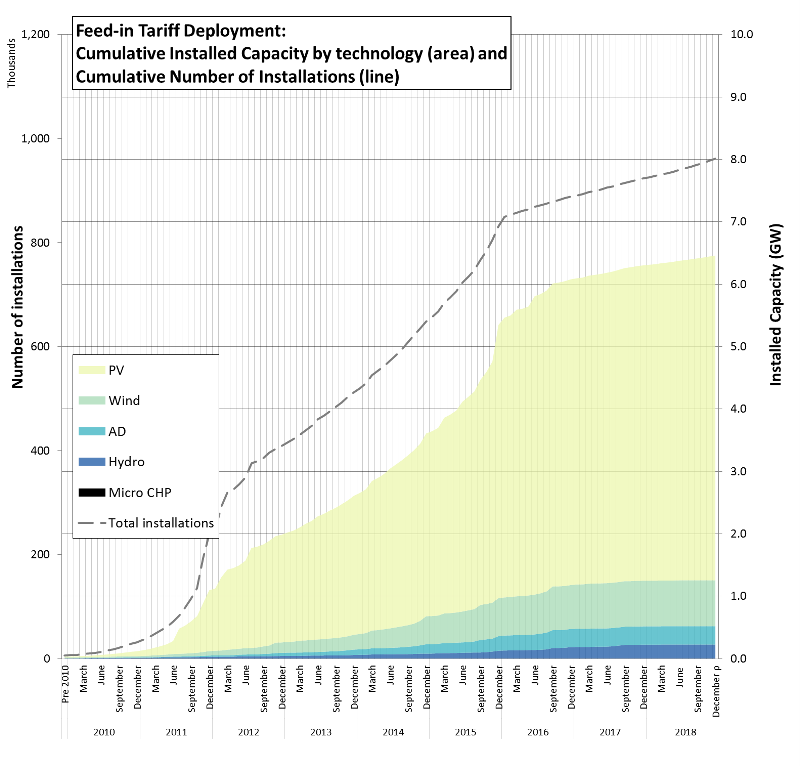Unit 1B, Keynor Farm
Sidlesham, PO20 7LL
8:30am - 5:00pm
Monday - 4:00pm Friday
Blog

The final cut
The government Feed In Tariff (and export tariff) comes to an end on the 31st of March 2019. 9 years after it was first introduced. We take a quick look at how it helped, and hindered the industry, as well as how it had a much more local impact on our company.
The beginning
April the 1st 2010, the Feed In Tariff finally starts, a move that the industry had been waiting for in anticipation.
The Feed In Tariff was introduced to encourage the public to install renewable energy on their properties, both commercial and domestic. This had come after misconceptions around the viability of solar in the UK had been dispelled. Some officials didn’t see solar working in the UK at all, whilst others thought that it would only be viable south of the M4.
At the time of the FIT starting very little solar had been installed in the UK, just over 7,000 installations in total across the country. Because of this low deployment the Government set a target of 1MW of capacity over the 5 years that the FIT was set to run.
The target was smashed within 9 months of the FIT programme starting. This caused a panic as fears over funding rose. The decision was made to cut the amount given out under the FIT scheme from 52.75p/kWh to 19.51p/kWh (for retrofit solar PV up to 4kW).
This also saw a change in the way installations were categorised. New build solar and retrofit solar were combined and grouped in with ‘standard solar’. The biggest impact seen was the change in tariff for >4kW-10kW systems, these saw a propose cut of 87%.
The boom
With the announcement of the cuts there was a sudden rush in installations, on an unprecedented scale. This was partly down to the announcement of a cut in the tariff, but solar prices had dropped, and were continuing to fall, it was becoming cheaper to install solar, and still get the high tariff payments.
Our company, which was Wagner Solar UK back then, experienced a huge rush in demand from right across the UK. To meet this demand more staff were bought in to pick and pack orders, as well as assemble parts. Huge amounts of stock were bought in, and we were all working long hours!
Darren, Wagner’s Warehouse Manager looks back with fond memories “It was a fun time, hard work, but fun. The whole company pulled together to work as a team. I remember one particular day we had so many lorries in our business park we got to the point where we blocked the access, we couldn’t get any more vehicles in!”
Back then we had 5 out of the 8 warehouses on the business park, and each one was full to the brim.
With the sudden boom in solar deployment, came a large increase in people installing solar, everyone was getting in on the action, charging over-the-top amounts for installations, and often not doing a particularly good job!
The rush was good for business but we all knew what was to come.
The cut
It was inevitable, the government had announced the cuts and they were to go ahead despite calls for a less harsh cut. Even though the planned cuts were already graduated, such a sudden drop was seem as damaging to the industry.
March 2012, it happened, over night the industry went quiet. We were forced to let all of our temporary staff go, job losses were also seen among the staff who had been with the company from the start. Sadly we saw redundancies from all parts of the company, sales, admin, warehouse & packing, as well as seeing our own transport team go.
It took months before the public started have faith in the industry again. Many people thought that the FIT payments had disappeared completely, a misconception that still stands today, albeit now correct.
By the time the first FIT reduction was in place around 315,000 installs had been completed, an extraordinary amount from the 7,000 just two years previous.
This has seen standards improve though, products must be MCS approved, as must the installers. Rigorous checks were put in places, with yearly inspections on products, manufacturing, and installations. This pushed out many of the cowboys who were in it purely for the money with little regard for workmanship or the customer.

Credit: UK Government
Where we are now
The industry has slowly recovered, it’s been a few years of ups and downs, with the industry being dubbed the ‘solarcoaster’. The graduated cuts have come and gone seeing more small rises in sales followed by quiet periods.
As the axe falls on the FIT there has been a final rush, latest figures aren’t in just yet, but over 952,000 installs have been completed across the UK, totaling over 6.5GW. Much more than was ever planned, or could have even been expected when the FIT was first planned.
Importantly it has become a much more stable industry. Each FIT reduction has seen less and less impact as people change their mind set more towards green energy and protecting themselves against future price rises, rather than trying to generate an income. As prices have continued to drop, and solar technology has advanced, as well as new technologies coming onto the market, the industry is starting to thrive.
The disappearance of the FIT is seen by some as the End of the Beginning. With higher standards in place both across products and installation practices the industry is a safer and more reliable one with green technologies, innovation, and the customer put at the forefront. For all that the industry has been through it isn’t given the credit it is due. It has survived and grown against all odds, an amazing feat.
For us here at Wagner, we’re a streamlined company now, we have a smaller but still hard working team working out of a warehouse in the same place it all started. As well as UK distribution we are sending goods right across the world, with support packages in place to help our international customers. We’ve also branched out to offer local solar installations, as side of the buisness that has really boomed over the past 2 years. Read our blog about the Sunny future of solar.
Sources;
Solar Power Portal
Ofgem
Government Statistics




